
Disastrous Consequences: AI Innovators Call for Global Collaboration to Avert Lethal Computer Dominance
Renowned AI pioneers are sounding the alarm about the escalating risks associated with artificial intelligence, urging a collective global approach to mitigate potential catastrophic outcomes. This call for action comes from leading scientists in the field, including Yoshua Bengio, Andrew Yao, and Geoffrey Hinton, who emphasize the threat of losing human control over AI systems.
Warning from AI Pioneers
In a series of discussions, these influential figures expressed grave concerns about the trajectory of AI technology. They warn that the unchecked evolution of AI, particularly its potential for malicious use, could compromise human safety and survival. The specter of autonomous systems operating beyond human control looms large, igniting fears of catastrophic consequences.
Need for Global Oversight
The scientists are advocating for the establishment of a global system of oversight to address the multifaceted risks associated with AI. They propose that each country creates AI safety authorities responsible for registering AI systems and coordinating international efforts to set up red lines and early warning signals for dangerous AI developments.
Current Lack of Preparedness
A pressing issue highlighted by these experts is the absence of a well-structured plan to manage AI systems if they were to develop autonomous self-improvement capabilities. This lack of readiness leaves humanity exposed to the potential for disastrous outcomes, emphasizing the critical need for proactive strategies in AI governance.
International Cooperation
Collaboration between nations is essential, the group insists. They propose that AI safety authorities from different countries engage in dialogue to reach a consensus on standards and warning signs for AI systems. Such cooperation is crucial for ensuring a coordinated response to the disruptive potential of advanced AI technologies.
Potential Risks
AI systems pose a range of potential risks, including their ability to replicate autonomously or deceive their creators intentionally. The rapid commercialization of AI has led to the widespread deployment of powerful technologies without sufficient safety measures in place, heightening these concerns among researchers and policymakers alike.
Recent Meetings and Discussions
In light of these pressing issues, AI pioneers have convened for discussions, including a recent meeting in Venice organized by the Safe AI Forum as part of the International Dialogues on AI Safety. Earlier this year, they also briefed senior Chinese government officials, further highlighting the need for international dialogue on AI safety.
Emotional and Psychological Impact
The scientists’ concerns extend beyond intellectual apprehension; they are grappling with emotional challenges as well. Yoshua Bengio, among others, poignantly reflects on the psychological toll of recognizing that their innovative work could inadvertently contribute to destructive outcomes. This introspection underscores the complexity of navigating the balance between technological advancement and human safety.
Conclusion
The urgent call from AI innovators for worldwide collaboration highlights the intricate and pressing challenges posed by advanced AI systems. As the implications of their work become increasingly entwined with issues of human safety, the necessity for coordinated global action to establish AI governance frameworks has never been more critical.
